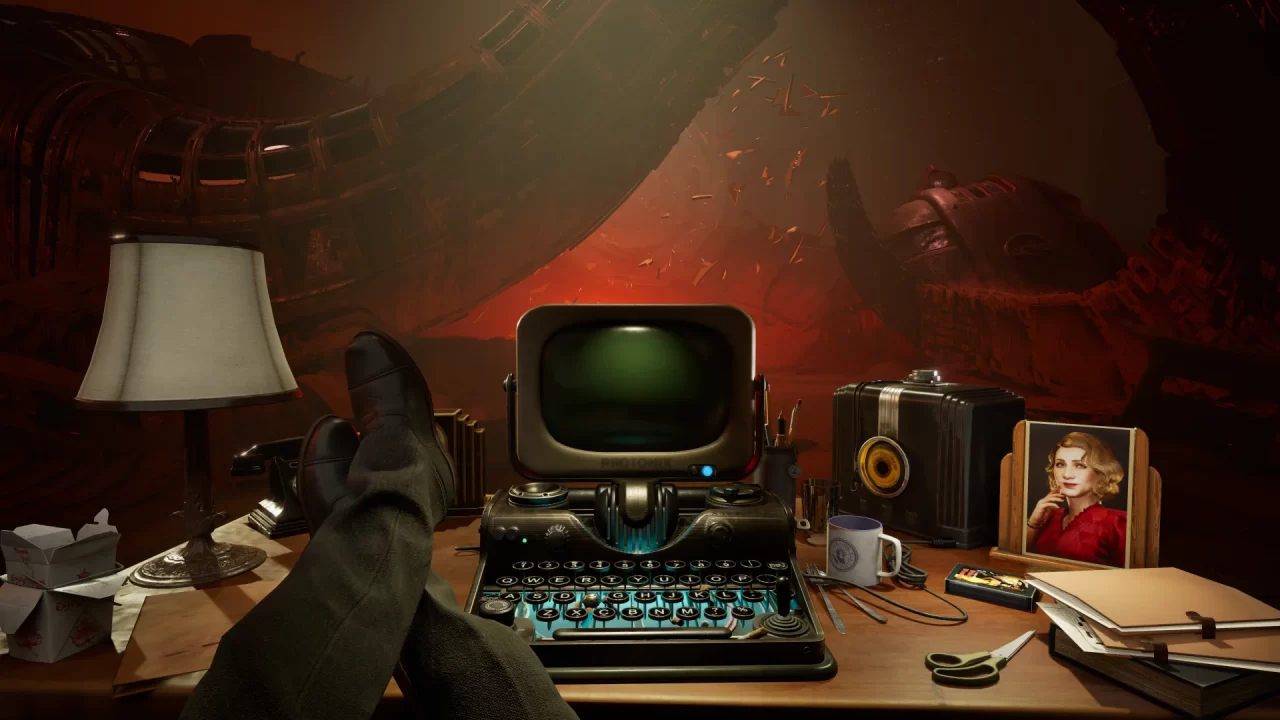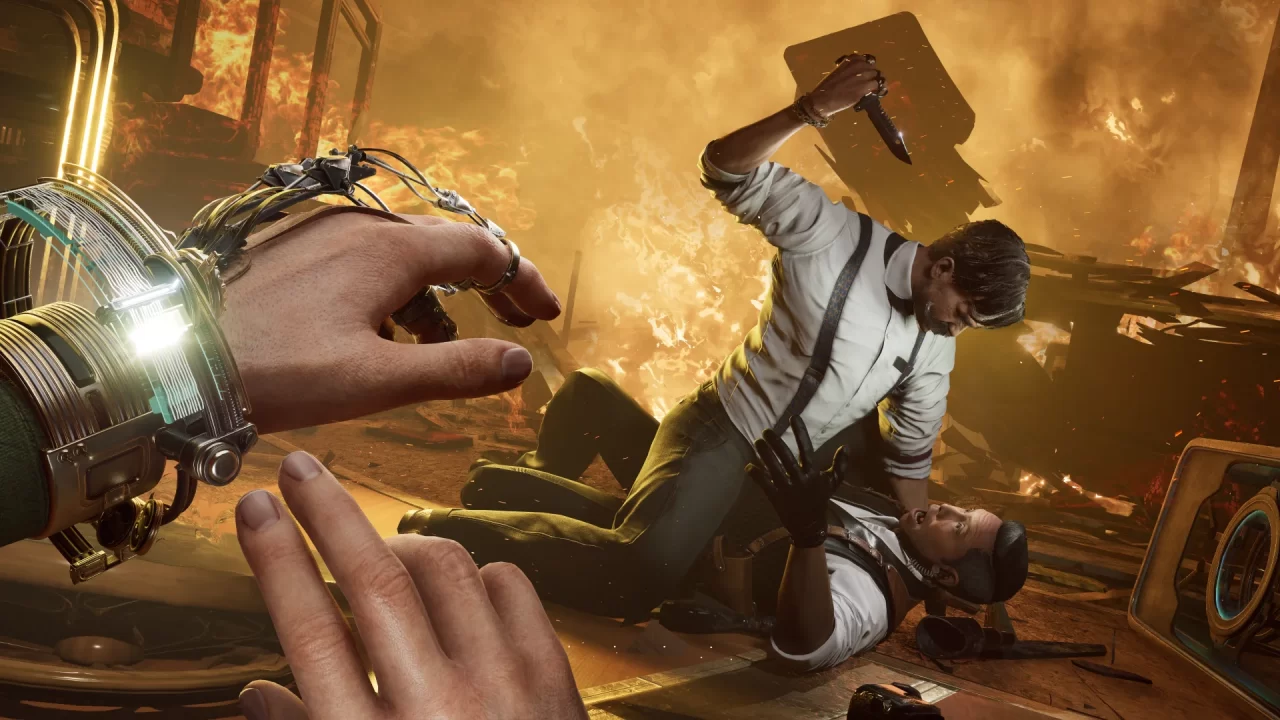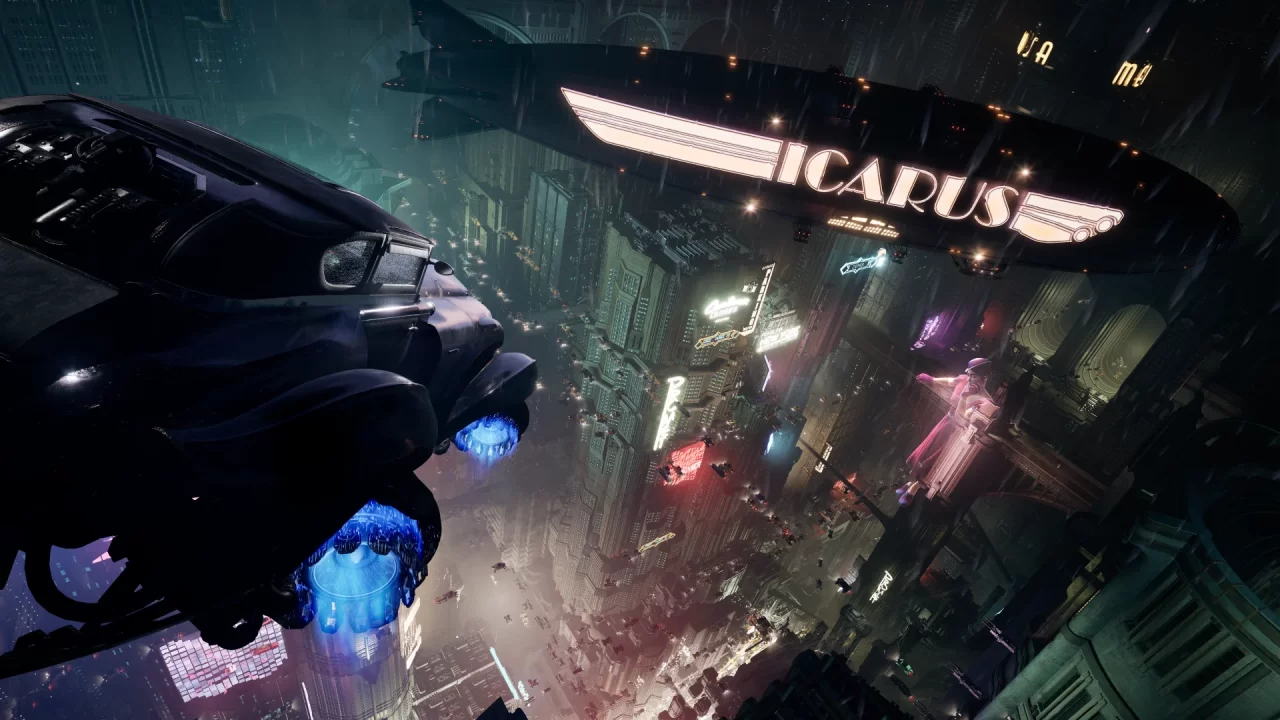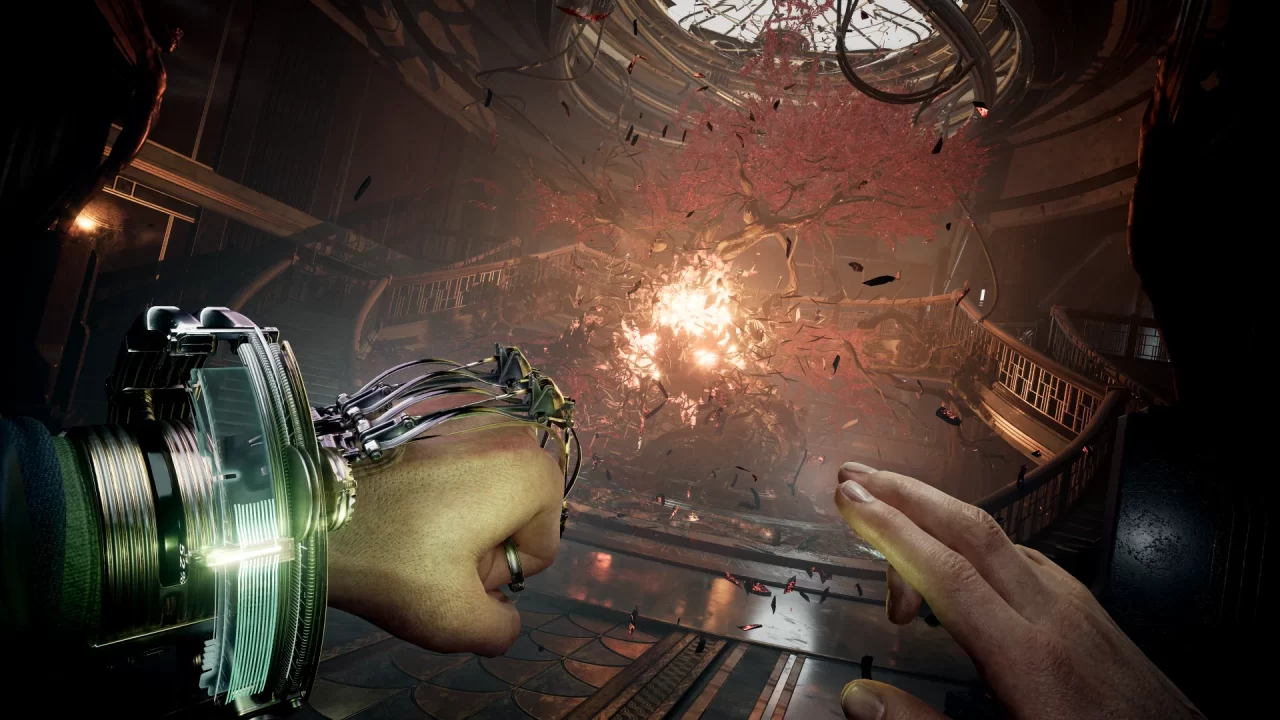A niche genre of storytelling I can’t get enough of is detective noir. Nobody Wants to Die screams—sometimes literally—with detective noir essence. Everything about it, from the dark, rainy visuals to the long, somber horns to the professional voice acting, creates the atmosphere one expects. That alone suckered me in, even if it felt like a caricature of itself at times.
James Karra is a down-on-his-luck detective who wakes up in a new body following an incident he can’t quite remember. The police chief puts him on leave and refuses to let him officially back on the squad, though the police chief has unofficially put him on a case of magnitude because the two go way back. Since he can’t act officially, he’s under the care of a police liaison named Sara, who joins him via earpiece while he investigates scenes in first-person.
The world in Nobody Wants to Die is distinctly dystopian. Taking place sometime in the 23rd century, New York exists in the sky, with only the poorest living in slums on the ground. Our era has long since been forgotten except in history books. Sci-fi technology, a corrupt government, and immortality rule this world. Humans achieved Immortality hundreds of years ago through a substance known as ichorite, a material planted in the brain that can transplant someone’s consciousness to a new body. An aged body needs a replacement, right? Enter the subscription service.
Starting at age 21, folks must pay a subscription fee (a tax) to inhabit their body. If you miss a payment, the police will come and take your body so that some wealthier chap or lass can enjoy your youthful skin and innards. Dystopian enough for you?
Nobody Wants to Die‘s story is ostensibly about James dealing with constantly resurfacing memories of his dead wife and solving the case he’s on. The story’s volatile political climate and social unrest are detailed in the background through newspapers and news on the radio. James’ relationship with Sara is also an ongoing source of drama—welcomed drama, though. The good kind.
Sara and James’ relationship starts pretty rocky and evolves—at least in my playthrough. Throughout the game, an all-too-familiar pop-up appears in the top left of the screen, assuring me that my binary dialogue choice absolutely matters and will change the storytelling. I take this in faith because I had no in-game indication that this was happening aside from the game telling me so.
James engages with his environment through little interactive icons that overlap objects of interest. Doing so offers some less-than-jolly commentary from James or Sara and improves the flavor and world-building. Dialogue choices sometimes contain locked or unlocked dialogue options, though it’s never clear how they unlock. Most of the gameplay sections in which James has to use his tools to uncover mysteries are less skill- or deduction-driven and more a process for reaching a conclusion; I’m fiddling with gauges and timing presses, but they don’t meaningfully impact outcomes. In short, this is a walking simulator with bells and whistles.
Walking simulator can be a dirty description in these parts, but not for me. A well-designed walking simulator can tell a story just as well or better than most other games, but I’m using it here to describe how the game unfolds. While using x-ray machines, turning back and fast-forwarding time, and wielding a UV light sound fun, they don’t do much besides create immersion—which is good! I never felt like I was “playing” the game, but I did feel plopped into this terrible world, and I was pretty happy about that.
Speaking of immersion, one look at a video or some screenshots of Nobody Wants to Die will tell you this is a visually outstanding game. Throughout the entire experience, no visual blemishes surfaced; the level of excruciating detail sometimes floored me as I fast-forwarded and rewound scenes of chaps getting blasted, but such is the life of a detective in the future. The old-timey hover vehicle’s polished interior charmed me while I drove around, just taking in the awe-inspiring cityscape despite this dystopia’s soullessness.
If you’re familiar with the detective noir genre, you already know what Nobody Wants to Die sounds like. Drawn-out horns oozing with melancholy accentuate the already depressing, lethargic reality James inhabits. Similarly, James sounds just like those brooding detectives, smoldering cigarette in the ashtray and all. While stellar in performance, the delivery of James’ lines sometimes felt a little too detective noir, as if a parody of itself; I couldn’t determine if this was purely the script or the delivery, though it’s likely a combination of the two. Overall, Philip Sacramento, the actor, did a phenomenal job, though Keaton Talmadge‘s Sara is the standout performance. Talmadge delivers her lines outstandingly, never faltering and always believable. I’ve heard few voice actors with her level of talent, only matched perhaps by Ashly Burch. Both actors do a wonderful job bringing the characters to life. The actors seem to have just begun their careers in 2020, so here’s hoping we hear more from them because they certainly deserve it.
While the controls stymied the experience a bit with occasional clunkiness and awkward targeting, they didn’t present any meaningful detraction from the experience, though it highlights that while Nobody Wants to Die looks and sounds like a AAA experience, this is a game from a studio looking for a breakout hit. Without a doubt, I enjoyed Nobody Wants to Die, though blemishes exist.
While the solving-crimes-with-doo-dads gameplay is immersive, it never really made much sense from a logical perspective. Whereas games like Ace Attorney require the player to draw links between evidence and arguments, I felt like I was just clicking on prompts when instructed. James and Sara had me doing all sorts of stuff, making their own conclusions that didn’t quite sink in for me, but I merrily followed along. Again, not bad, but it would have been better if all of the whiplash time manipulation made intuitive sense. James essentially narrates or explains his thought process with Sara, and I, as the player, have to just do what he says. I don’t immediately understand his logic, but I readily accept what he says just to move things along.

As much as I rooted for James and Sara throughout the six-hour jaunt, I didn’t feel like I earned the ending I deserved. I felt like I made many good decisions but ended up with what I think is the “bad ending,” and not bad in that I’m not satisfied by it, but bad in that it didn’t answer any questions or land anywhere that makes sense. It makes sense from a fatalistic perspective, but this is not an individualized ending based on my decisions. I just didn’t magically land upon the correct sequence of choices to earn an appropriate ending, which can be incredibly deflating after a journey I was intimately invested in.
Nobody Wants to Die ventures into the philosophical, starkly discussing immortality and human rights. There are some parallels with our world, especially with cynicism and political corruption. However, Nobody Wants to Die avoids feeling preachy, which is all well and good, but part of the limitation of a six-hour game is that this realistic world and these vibrant characters don’t feel rooted to the bigger picture. The story focuses on the two leads so much that the larger issues, such as riots and environmental destruction, remain obscured. I love character-driven storytelling, and this is a fantastic example of it, but I almost feel like I missed out on something grander. Though, one of the chief rules of entertainment is to leave folks wanting more, so I can’t say this is a bad thing, either.
Detective noir has rarely felt so authentic in a video game; I can’t even think of a title that does it more genuinely. If that’s your bag, then this is an easy recommendation, but the journey can feel rocky, disjointed, and dissatisfying. Regardless of grievances, I fell in love, though briefly, with James and Sara. I wish they had a better go of it.





